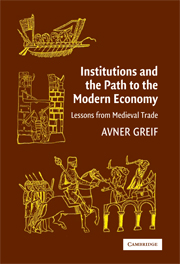Book contents
- Frontmatter
- Contents
- Abbreviations
- Preface
- I Preliminaries
- II Institutions as Systems in Equilibria
- III Institutional Dynamics as a Historical Process
- IV The Empirical Method of Comparative and Historical Institutional Analysis
- V Concluding Comments
- Appendixes
- References
- Index
- POLITICAL ECONOMY OF INSTITUTIONS AND DECISIONS
Preface
Published online by Cambridge University Press: 05 September 2012
- Frontmatter
- Contents
- Abbreviations
- Preface
- I Preliminaries
- II Institutions as Systems in Equilibria
- III Institutional Dynamics as a Historical Process
- IV The Empirical Method of Comparative and Historical Institutional Analysis
- V Concluding Comments
- Appendixes
- References
- Index
- POLITICAL ECONOMY OF INSTITUTIONS AND DECISIONS
Summary
This book grew out of an attempt to gain a better understanding of the causal factors underpinning economic and political outcomes during the late medieval period (circa 1050 to 1350). It was during this period that the Muslim (Mediterranean) World reached what many scholars consider to be the zenith of its commercial integration, whereas expansion of markets in Europe was so pronounced that prominent historians dubbed this phenomenon as “the Late Medieval Commercial Revolution.” Gaining a better understanding of this period therefore has the promise of advancing our knowledge regarding why and how effective markets and economically beneficial polities prevailed in some historical episodes but not in others. Although economists have long emphasized the welfare-enhancing implications of market expansion, we know surprisingly little about the source for historical trajectories of market development.
This period is also of interest because it was a point of bifurcation in the histories of the Muslim and European worlds. The Muslim world was probably more advanced economically, technologically, and scientifically than Europe during the late medieval period. Indeed, the Europeans learned a great deal from the Muslim world at the time (e.g., Watt 1987). In subsequent centuries, however, the Muslims developed economically and politically along a different path from the Europeans, and became economically worse off in the long run.
In attempting to understand this period and its implications on subsequent development, I benefited from the training in historical analysis that I received when pursuing an advanced degree at Tel Aviv University.
- Type
- Chapter
- Information
- Institutions and the Path to the Modern EconomyLessons from Medieval Trade, pp. xiii - xxPublisher: Cambridge University PressPrint publication year: 2006

